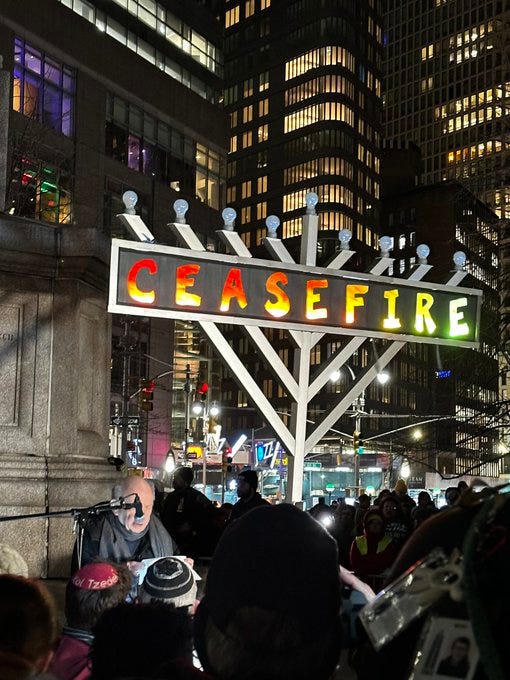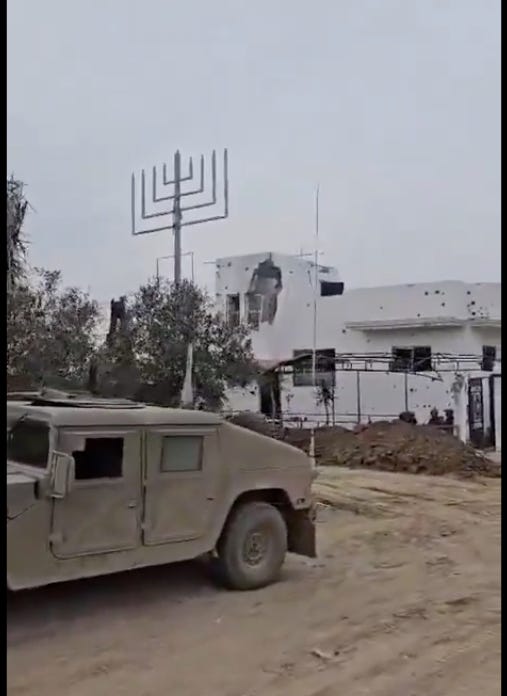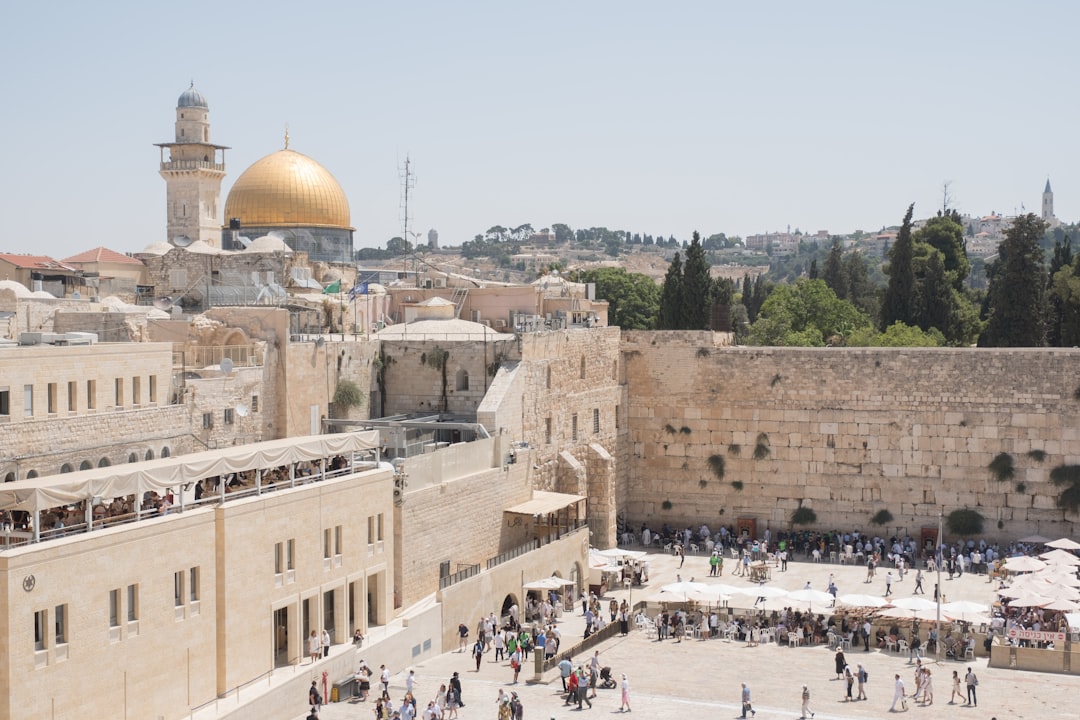I’ve never started this way, with images that speak louder than words. But this is the menorah, the chief symbol of Chanukah, the flames that might be flickering in your window, that might flicker in your neighbor’s window. Chanukah is “the festival of lights,” but this year the holiday is different amid such darkness. So here are the two images I am compelled to talk to you about today:


The image on the left (or on top depending on where you’re reading this) is from Blake Pruitt of IfNotNow NYC. It is from the first night of Hanukah this year, where a huge crowd of Jewish New Yorkers got together to usher in the first night of this holiday the only way that felt possible this year, which is to call for a ceasefire and promote a lasting peace. Opposite it, in so many ways, is an image from Israeli forces in Gaza. They brought a menorah into the Shejaiya neighborhood of Gaza after its occupation and the ethnic cleansing of its residents. This image hurts me, profoundly. It is the opposite of the tradition I grew up in, a twisted use of one of our iconic symbols, and an indication of the dangerous path that our religion, and really any religion, can be taken down when warped by fascism and colonialism and the abandonment of core principles. These images begin to tell us an alarming and tragically needed story. And in the middle of this Chanukah I’d like to tell you some of the rest.
The story of Chanukah that I grew up with, that to the best of my knowledge most American Jews and Jews around the world grow up with, is the story of a guerrilla force fighting, and defeating, empire. At the time of this story, approximately 200 B.C., the Jewish people living in ancient Judea were ruled over by the Seleucids, one of the imperial powers to emerge in the wake of Alexander the Great and the division of the massive Greek Empire. The first Seleucid ruler allowed Jews to practice our religion without harassment, but his son took a different approach. The son, Antiochus IV Epiphanes, tried to Hellenize the Jews, outlawed our faith, and forced us to worship Greek gods. The story of Chanukah I grew up with was the story of the rebellion against this empire, against their desecration of the temple, and their oppression of our people. It is a story of guerrilla warfare kicked off by a priest named Mattathias and his five sons, and won under the leadership of Judah Maccabee after his father’s death. It’s a story of a relatively small and disempowered people defeating an imperial power that tried to squash and erase us. At least, this is what I was taught, perhaps combined a little with my understanding of empire and resistance.
I recently learned another version, much to my devastation. It emphasizes the primacy of Jews fighting other, Hellenized Jews, and sidelines the role of the Seleucid Empire. One article written in support of this version of Chanukah reads, “We may not like to think of our joyous Hanukkah festival in such dismal terms, but the revolt of the Maccabees was not against the Greeks, as Hanukkah children songs describe, but against our own rogue brothers.” This interpretation haunts me because it manages to make assimilated Jews the enemy without considering why they might have made that choice, and in doing so excuses the power, the violence that leads people to make these decisions. It excuses the violence that upheld and upholds status quos everywhere. It pits siblings against one another and ignores the system that placed a wedge in the middle of our people. As Director of Jewish Voice for Peace Stephanie Fox recently wrote, “The idea underlying this focus of the story is that might is right.”
This narrative haunts me doubly, haunts so many of us doubly, because of how it is being used at this moment. I began looking into the use of the Maccabees, the Jewish fighters who beat back the Greek Empire, after seeing multiple far-right Israeli politicians and propagandists celebrate the might of these warriors in the context of the genocide in Gaza. The comparison doesn’t just ring hollow, it rings fake and twisted and speaks to a gross distortion of values. For one, there is the simple fact that Israel is the superior military power in this case. The technological advantage, the ability to bomb this small strip of land so thoroughly that over 60% of the housing is destroyed or damaged, makes any comparison to the underdogs who fought over 2,000 years ago utterly disingenuous.
There is also the slightly more nuanced, but ultimately even more profound reason that comparing ancient Jewish underdog fighters to the IDF is deceptive and distorted. Even if one is invoking the Maccabees to discuss being true to your people, to call up a fight against assimilation and a fight for Judaism, this would reveal a fundamental misunderstanding of the role of Israel in the world schema. If anyone has assimilated into the dominant power structure, into Empire, it is ardent Zionists. Israel is, in countless ways, incorporated into the capitalist and imperialist West. Economically, militarily, and culturally it was formed out of this alignment and has cultivated this alignment. The idea that loyalty to our Judaism and loyalty to Israel can somehow absolve the nation of assimilation into the dominant and oppressive world systems is a shallow falsehood. And the idea that we should uplift the narrative of civil war against the “wrong kind” of Jews, above the narrative of resistance to harmful systems of colonialism and repression is one that helps enable the mass murder of Palestinians, and also leads to vitriol against anti-Zionist Jews.

We have a choice. In Judaism and every religion we have a choice. In 1845 the congregations in slave-holding states left the Methodist Episcopal Church and formed The Methodist Episcopal Church, South. That same year the Baptist Church split, with those who found themselves more loyal to the institution of slavery than their fellow Christians, fellow humans, forming a new denomination. People made their choices. Some chose death dealing and oppressive systems and institutions and others chose to side with liberation. Judaism already has multiple denominations and countless strands with it, and I am not here to talk about some formal split. I am here to examine the choices we have before us. We can stand with Israel as it perpetuates a genocide before the world, or we can resist. Thousands and thousands of anti-Zionist, anti-ethnic cleansing, anti-genocide Jews are already resisting in action and word alongside Palestinians and Muslims and Christians and Arabs and people of every stripe around the globe.
But there is also a narrative being woven, a narrative and ideology that is staunchly against empire and oppression. Those of us on this side have a long, long history to draw from. In Judaism, our libratory lineage stretches back before 200 B.C. and has continued year after year up into the present. We know that might does not make right because we have been subjected to the will of the strong and have suffered at their hand. We do want safety for ourselves, protection for ourselves, peace for ourselves. Yet we also want it for others, for everyone. We refuse to concede that the genocide of another people is the way to ensure Jewish survival. We refuse both because it is not true, and because it is not something we can accept.
We have a choice. We have a choice in the story we tell today. Are we a people who fight empire? Are we a people who resist oppression, not just our own but across humanity? Or do we think that our oppression was and is unique, and that we can and should harm others for our own ends? It is not just Jews who have this choice before us right now. All of us are confronted with these choices. Are we okay with living in a society where our comfort comes at the expense of others, atop the subjugated lives of others? The West is faced with this question in a moment of piercing clarity. It has been asked before, but in this dark hour the answer feels different. Masses of people are screaming out their answer, crying out their answer. It may fall on the closed ears and closed-off minds in the hall of power, for now, but we become harder to ignore every day. Gaza becomes harder to ignore every day.
There is one more story of Chanukah that is being told in homes and schools and synagogues across the world. Jewish families are gathering around, many telling their children of our history for the first time. And some will tell a story that is devoid of any implications for this present moment. Many will teach and be taught a narrative where the good underdog Maccabees fought the big bad Greeks, but where this history has no bearing on the present. The inherently political struggles of the past are often stripped and sanitized over time through this approach to history, and this is yet another choice we can reject right here and now. I am reminded of Ernesto Cardenal, one of my favorite Christians. He was a liberation theologian and Nicaraguan revolutionary. Cardenal and his compatriots show us that even in the Catholic Church, with its many faults and flaws, there is a powerful vein of resistance. Liberation theology rightly says that Christ sided with the oppressed, that to be true to his teachings one must work to shake off the systems and shackles of oppression everywhere. As Cardenal once said, “You can't be with God and be neutral.” How true that is when your God is being weaponized against people sheltering in a hospital after their home was destroyed by an inconceivably powerful weapon rained down from the sky.
So let us reject a stripped, sanitized Chanukah, this year and every year. Let us reject neutrality in situations of oppression. Let us doubly reject reaching into our own histories to mask the realities of violence in this moment. We have a choice. Do we spin a narrative where only strength makes righteousness and where only violence builds safety? Do we spin a narrative where attacking our kin makes us righteous and where oppressing others makes us mighty? Or do we see the rich vein running through thousands of years and cling to it, hold to it even in moments of such darkness that it is hard to see what we grasp onto? Do we hold fast to this vein of resistance, of solidarity, of fighting against empire and oppression? Each and every one of us has a choice.
What is your choice to be?


Thank you for this article, grounding faith in true spirituality. Not tying it to a nation or a govt.
Found these few sentences (pasted below) so profound, so accurate. We ALL have a choice to make, regardless of our religion.
"We have a choice. We have a choice in the story we tell today. Are we a people who fight empire? Are we a people who resist oppression, not just our own but across humanity? Or do we think that our oppression was and is unique, and that we can and should harm others for our own ends? It is not just Jews who have this choice before us right now. All of us are confronted with these choices. "
I always enjoy your compassion ❤️
At this very moment, I am experiencing a somewhat frequent spiritual quandary. If there is a "God" how would he/she/them/they allow all this horror. So I don't personally believe in a God per se, but I believe in the universe, and maybe you can call that god or goddess or whatever. But I believe all of us, and in saying us I include the trees the birds, all of nature & anything that energy runs thru.
But no matter anyone's personal beliefs, if they honor other humans regardless of their beliefs as equals, then I stand with them, with you, with everyone opposing this system of oppression, this history of oppression, this oligarchy based in consumerism and capitalism, where if there is any god, it is money & power. These are the 2 most hollow addictions I've ever come across, and responsible for the most damage to other humans by those who hold those things dear.